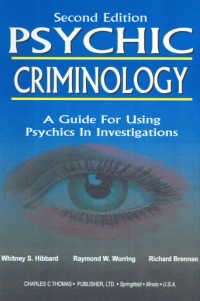Psychic Criminology, Second Edition: A Guide For Using Psychics In Investigations
 By Whitney S. Hibbard, Raymond W. Worring, Richard Brennan
By Whitney S. Hibbard, Raymond W. Worring, Richard Brennan
Charles C. Thomas PUBLISHER LTD, Springfield, Illinois, 2002 Click here to purchase this book!
The first edition of this book, described as a “practical operations manual,” was published in 1982. Author Raymond W. Worring died in 1998 and Richard Brennan replaced him for the second edition, contributing sections on remote viewing and adding a new chapter titled “PSI Case Files.” In the Preface To The Second Edition, Whitney Hibbard writes: “The intent of this book is not to be a critical appraisal; that has been done comprehensively elsewhere, most notably in the highly recommended The Blue Sense: Psychic Detectives and Crime, which also is a careful and well-documented look at the many pitfalls of working with psychic sleuths. The first edition was criticized in some quarters for being overly sympathetic and uncritical about the role of psychics in investigations. This criticism has been addressed in this edition … However, the book remains unapologetically supportive of the use of psychics as investigative aides, as long as they are used in a disciplined, efficient, and professional manner.” For better understanding of Psychic Criminology as a manual for law enforcement officers (while the book will also be of value for everyone with interest), The Blue Sense, a 1991 publication by Arthur Lyons and Marcello Truzzi, Ph.D, will prove a helpful companion study. The Blue Sense is referenced several times in Psychic Criminology and it offers such a thorough treatment of its subject it could be used as a “foundation course” for the entire field of psychic detection.
From a careful reading of these two books alone it becomes clear that what the science of the spirit describes as the essential next step in the evolution of consciousness, the development of the new capacities for clairvoyance or spiritual perception, has been assiduously taken up in its preliminary stages — psychic phenomena — in areas where it is most needed, in the fight against crime, which is increasingly exposing the public and law enforcement officers to a barrage of sick, irrational, tragic, violent and dangerous situations, not to mention the unending frustrations caused by a top-heavy legal system that rules far too many times in favor of the criminals. “According to Chief James Basil of the Buckland, Massachusetts Police Department, one of the few police officials to go public on the subject, ‘A lot of police departments may use psychics, but they will only admit it off the ‘record’ … In all likelihood, increasing public pressure eventually will force law enforcement personnel to use psychics more frequently. This is evidenced by the escalating number of requests for help that psychics receive from victims’ families … The current situation is summed up nicely by Karen Henrikson and Chief Kozenczak (ret.), chief investigator on the John Wayne Gacy case, in their article Still Beyond Belief: The Use of Psychics in Homicide Investigations: ‘The world of parapsychology has a great deal to offer… Having once experienced the positive attributes a psychic can lend to a case, parapsychology seems to be a natural companion to the world of criminology.’ One of the purposes of this book is to foster that companionship.” Awareness of the necessity for standards, codes of ethics, and a heightened sense of morality is evident in articles and books about the developing science of psychic criminology (e.g., some psychic sleuths ask for payment beyond expenses and seek publicity), and the constant everyday work required in distinguishing truth from falseness in many investigative areas transfers over into level-headed assessments of psychics and psychic phenomena. The authors stress that it has become essential to avoid wasting time, human resources and funds.
Parapsychologists have become aware of the unique states of consciousness between waking and sleeping, and it seems that in the use of “forensic hypnosis” — defined as the use of hypnosis during a legal/criminal investigation, conducted with witnesses and recorded — the subject does not lose consciousness, but enters into an altered state of consciousness. It is to be hoped that any methods that cause the subject to become unconscious and “taken over” by some unseen entity will be recognized as spiritually unlawful and hence harmful. Just as there are natural and social laws, there are spiritual laws. The Blue Sense offers an interesting passage on hypnosis in Chapter Nine, “Psychic Success Stories.” Regarding the mentalist Kreskin (George Joseph Kresge, b. 1935), More »